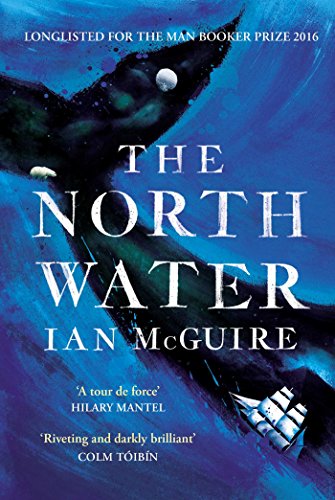Book Description

India | International
The North Water is a 2016 novel by English author and academic Ian McGuire.
The book was long-listed for the Man Booker Prize 2016 and was in the New York Times list of 10 Best Books of 2016.
The North Water Book Summary
The North Water by Ian McGuire is a dark whaling yarn with the about humanity under the most extreme conditions of the Arctic. One could think of it as a combination of Joseph Conrad’s Heart of Darkness and Herman Melville’s Moby Dick.
The ship becomes a morally null universe, isolated on the north water. There are echoes here of Conrad’s Heart of Darkness: if horror lies at the core of existence, what response is possible?
The North Water by Ian McGuire review – a voyage into the heart of darknesss
The Guardian
Ian McGuire’s second novel is an unflinching look at what men do, in extreme circumstances, for money, to survive, or for no reason at all.
Night Jars | Thomas Jones
London Review of Books
The North Water Book Review
The North Water is a well-paced dark whaling thriller set in the 1850s about evil, mystery, and humans battling the severe conditions of the Arctic.
It is a quick read with excellent prose. Though there’s quite a bit of violence against humans and animals, the visceral details together with the language lends authenticity to the tale.
After character building in the first few chapters, the narrative gathers pace, and the point of view oscillates between two principal characters. Henry Drax is an evil harpooner, a killer by profession, and who is “.. a doer not a thinker”. Patrick Sumner is a surgeon trying to save lives, can’t help being a thinker, is trying to escape his guilt-ridden past. Both have one thing in common: they are survivors.
If you like thrillers, mysteries, or a well-written book, then this is a must-read.
The North Water Quotes
A few quotes from the book that I liked starting with my favourite.
Only actions count, he thinks for the ten-thousandth time, only events. All the rest is vapor, fog.
It is a grave mistake to think too much, he reminds himself, a grave mistake. Life will not be puzzled out, or blathered into submission; it must be lived through, survived, in whatever fashion a man can manage.
The most important questions are the ones we can’t hope to answer with words. Words are like toys : they amuse and educate us for a time, but when we come to manhood, we should give them up.
He finds the lying comes easy enough, of course. Words are just noises in a certain order, and he can use them any way he wishes. Pigs grunt, ducks quack, and men tell lies: that is how it generally goes.
He is not ashamed of what he has been or done: a man makes his mistakes, he tells them, a man suffers as he must suffer, but the readiness is all.
There is no one there he recognizes. The world is enormous, he tells himself, and he is a tiny, unmemorable speck within it, easily lost and forgotten. This thought, which would not normally be pleasing to anyone, pleases him now. His plan is to dissolve, to dissipate, and only afterwards, some time later, to re-form.
“The world we see with our eyes is not the whole truth. Dreams and visions are just as real as matter. What we can imagine or think exists as truly as anything we can touch or smell. Where do our thoughts come from, if not from God?”
But to be nothing is also, looked at from a different angle, to be anything at all.
The yellow moon is lodged like a bolus in the narrowed throat of the sky.
The stars have swivelled, the swollen moon is half hidden behind a bank of nickel-plated cloud
They sail north from Lerwick through long days of fog and sleet and bitter wind, days without ease or let-up, when the sea and sky meld together into a damp weft of roiling and impermeable greyness.
A man should look forwards and not backwards.
The world is enormous, he tells himself, and he is a tiny unmemorable speck within it, easily lost and forgotten. This thought, which would not normally be pleasing to anyone, pleases him now. His plan is to dissolve, to dissipate and only afterwards, some time later, to re-form.
‘You’re a fortunate man, I would say,’ Sumner answers, gazing round the grimy shop again. ‘Fortunate to have so much to lose.’
‘He will forget the dead one soon enough,’ he says. ‘Affection is a passing thing. A beast is no different from a person in that regard.’
Dreams are just a way to clear the mind; they’re a form of purging. What you dream is whatever’s left over and can’t be used.
One thing happens, then another comes after it. Why is the first thing more important than the second? Why is the second more important than the third? Tell me that.’ ‘Because each action is separate and distinct, some are good and some are evil.’
‘You please yourself, as I please myself. You accept what suits you and you reject what don’t. The law is just a name they give to what a certain kind of men prefer.’
The only devil is the one inside ourselves. Evil is a turning away from good.
All that exists is this single moment, this event.
‘If you can’t save him, then why are you here?’ she asks. ‘What are you for?’ ‘I’m here by accident. It doesn’t mean anything.’ ‘Everyone died except for you. Why did you live?’ ‘There is no why,’ he says.
The North Water Preview
India | International
Read More Like This
- The Narrow Road to the Deep North by Richard Flanagan
- The Supernova Era by Cixin Liu – Book Review
- Poems for the Soul by Sanober Khan
Recent Articles
